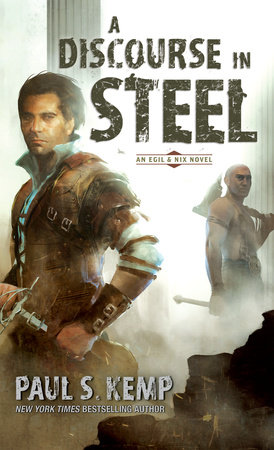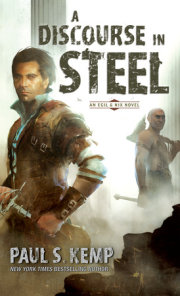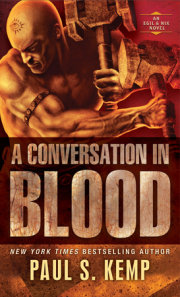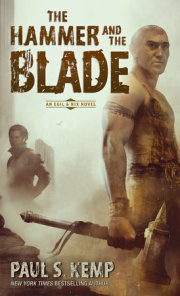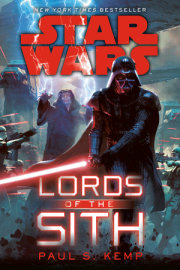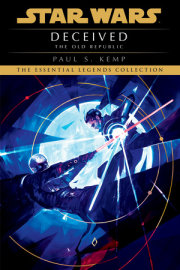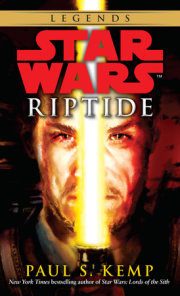Chapter
One
Ool’s clock rang two bells, the deep gongs of the mad mage’s spire filling the quiet of the small hours. The streets were empty and the city felt like a tomb, haunted by memories of vice and violence. A cold rain fell, the heavy drops thudding like sling bullets against Nix’s drawn hood. The wind screamed through the narrow night-shrouded streets, drove the rain into horizontal sheets. Nix drew his cloak tighter about him. As always when he walked the Warrens, he dropped a copper common or silver tern every now and again, leaving them in the road for anyone to find, little seeds of hope and relief for the stricken.
He had his falchion drawn, and Egil had a hammer in each fist, though the precaution appeared unnecessary. Only fools walked the streets of Dur Follin on this night, at this hour, and the denizens of the Warrens were desperate, but not fools.
When the clock of Ool rings three bells,
And Minnear glows full and dire.
Walk not the streets, but fear the Hells,
Or lose your life entire.
’Ware the alley that comes in black.
For souls once lost, ne’er come back.
Nix recalled the rhyme from childhood, probably everyone in Dur Follin did. He thought he’d actually seen Blackalley once, as a boy. It had been just after the third hour, deep in the night, and he’d marked a fat teamster for a purse lift. The man had staggered through the dark streets singing a mournful, drink-slurred dirge. Nix had followed, waiting for the right moment, and then . . . he’d felt something, a deepening in the air is how he thought about it in hindsight, and a wash of profound sadness. The teamster’s song had died and Nix had seen the man standing before the mouth of a narrow alley, an alley so dark Nix could not see even a step into it. The teamster mumbled something—Nix thought he might have been crying—and stepped into the alley. Nix had blinked, just once, and the deepening of the air, the sadness, the teamster, and the darkness were gone. He’d run back to Mamabird’s home after that and had never ventured into the streets at that hour again.
Until tonight.
He shook his head and put the memory from his mind.
“We should look in on Mamabird,” Egil said.
Mamabird, obese, ancient, and lovely, had been taking in groups of urchins for decades, feeding them, housing them, loving them. She’d saved Nix from a short, brutal life on the street, and he loved her as if she were his mother. Egil did, too. Everyone did.
“Tomorrow,” Nix said, and left unsaid what he knew both of them were thinking.
If we have a tomorrow.
The rain and damp raised the stink of the Warrens and the blowing wind did nothing to clear it. The cool air carried the foul reek of decay from the Deadmire, the vast swamp to the south, carried too, the pungent, wretched smell of mold and garbage and shite and hopelessness that permeated the Warrens. Nix was well acquainted with the odiferous air from a youth spent scrounging in the Warrens.
“Smells like wet dog,” Nix said, just to say something.
“Bah,” Egil said, and raised his hammers as if he could smite the offending stink with them. “It smells like a diseased dog that bathed in the Deadmire and then rolled in its own shite. I’d breathe deep the smell of a merely wet dog.”
“No doubt,” Nix said, unable to resist. “Your people are said to have a . . . well, let’s call it a fondness for their herd dogs.”
Egil stomped his boot in the muck, splashing Nix with mud.
“These are new trousers!” Nix protested.
“My people are likewise said to be impatient with sharp words from small men with dull minds.”
“A dull mind?” Nix said, his pride pricked. “Me?”
Egil shrugged under a wet cloak that hugged his mountainous form. “If it’s apt. And by small, I spoke of girth, of course.”
“What?” Nix stopped in the street and turned to face his friend, pointing at Egil’s broad-nosed face, barely visible under the cloak hood. “Small you say? Me?”
“Lacking in girth, I said. And I made only a general observation.” The priest waved a hammer noncommittally and started walking again, the mud of the street audibly sucking at his boots. Over his shoulder he said, “But again, if you think it apt . . .”
Nix ran after him, further splashing his trousers with mud. “I don’t.”
“Ah,” Egil said insincerely. “Well enough, then.”
“Well enough what?”
“It’s inapt. So you say.”
“So I say? There’s not a woman in Dur Follin who’d attest to your claim of small girth. Kiir only the most recent. And as for the rest, I was enrolled in the Conclave before I’d seen twenty winters. No one of dull mind could have done so. And, I’ll add, only a hillman of an infinitesimally small mind would think otherwise.”
“Infinitesimally,” Egil said, his tone carrying a smile. “Nice. But you quit the Conclave, Nix.”
“Now I know you’re just trying to be irritating. You know well that I was expelled.”
“So you say.”
“So I say?” Nix stomped his own boot in the muck, trying to splash Egil, but instead spattering himself with mud. He cursed and the priest ignored him.
“So I say? That’s what you say?”
“So. You. Say. That’s what I say.”
They both stopped, turned, and stared at one another a long moment. The rain beat down. Thunder rumbled. Each broke into a grin at the same moment.
“You did call my people fakkers of dogs,” Egil said.
“I meant nothing,” Nix said with a tilt of his head. “Trying to distract myself. And it warranted a rebuttal, I concede. But small of prick and dull of mind? One or the other would be fair, but both? That’s bringing a blade to a fistfight.”
Egil nodded. “A fair point. Apologies. I meant neither, of course.”
“Apologies likewise,” Nix said. He checked the sky, their surroundings. “Let’s just get this over with.”
He walked on and Egil fell in beside him.
“Aye,” the priest said. “What is it that we’re looking for?”
“A good spot.”
“There’s under an hour remaining.”
“I know.”
Nix ticked away the moments in his mind as he sought a likely intersection, searching for promising alleys. Egil hung one of his hammers from a loop on his belt, took out a pair of dice from a beltpouch, and shook them as he walked, the sound barely audible above the beat of the rain.
Kulven’s light was visible now on the horizon, though the cloud cover turned it into a shapeless silver smear. Minnear, the smaller, green moon of mages, would rise within the hour. Nix had to have everything prepared before that.
“Fakking rain,” Egil said from the depths of his cloak. “This is a night for Gadd’s ale and fish stew.”
“It is,” Nix agreed absently, eyeing the surroundings. “I blame you for my lack of drunkenness and the empty belly.”
“Me?”
“Of course you,” Nix said. “You’ve never been able to say no to a lady.”
Egil stopped and turned to face him. “Wait a moment, now . . .”
“Here,” Nix said, looking past Egil. “Right here.”
They stood on a narrow, muddy road in the Warrens, at the intersection of two streets. Nix could see the dark rise of the Heap above the sagging roofs of the nearby buildings. Beyond that, backlit by Kulven’s dim light, rose the great spire of Ool’s clock.
Dilapidated buildings lined the street, creaking in the wind, leaning against one another for support like drunks. A shutter banged now and again in the wind. Alleys opened in the narrow gaps between the buildings, four of them. Just what Nix had been seeking.
Egil threw back his hood, blinking against the rain, and looked around. He ran his hand over the tattoo that covered his bald pate—the eye of Ebenor the Momentary God, aflame in a sunburst, a divinity that had lived and died in the span of a moment. To Nix’s knowledge, Egil was Ebenor’s only worshipper. And worship perhaps stretched the word into unrecognizable form.
“Nervous?” Nix asked.
Egil shook his head slowly, the way he did when thoughtful. “No, but this feels different than our usual.”
“Agreed. Not too late to turn back,” Nix offered, knowing what his friend’s response would be.
“We gave our word,” Egil said.
Nix nodded, threw back his hood, and unslung his satchel of needful things, both magical and mundane.
“You gave it, at least,” Egil continued, “You wouldn’t even take payment.” Egil pocketed his dice and retrieved his second hammer from its thong.
“Sometimes you have to do the right thing, Nix.”
“No harm in getting paid for doing it, though,” Nix said. He glanced over at Egil and winked. “You were charmed by the lovely professor, yeah?”
Egil would not look him in the face. “Bah! I simply think one of us has to bring a conscience to this partnership.”
Nix smiled and pressed no further. “Best that be you, I suppose.”
“Best indeed,” Egil said with a harrumph, and shifted on his boots. “She was lovely, though.”
An old instructor of Nix’s from the Conclave, Professor Enora Fenstin, had sought out Nix at the Slick Tunnel. Professor Fenstin—tall and shapely, her long dark hair marked with a single, striking band of gray—drew the eyes of all in the Tunnel the moment she walked in, including Egil’s. In hindsight, Nix realized that the priest had been smitten from the moment he’d seen her.
Enora, obviously uncomfortable amidst the smoke and drink and bawdiness of the Slick Tunnel, had explained that her colleague, Professor Reen Drugal, had disappeared while doing research on the mysterious phenomenon everyone called Blackalley.
Nix and Egil had cursed as one.
“I thought the High Magister banned further research on Blackalley.” Nix said.
Enora did not make eye contact, studied the table as if it were interesting. “He did.”
Nix understood. “Drugal’s work was unsanctioned by the Conclave, then?”
Enora nodded once, brushed the waves of her hair out of her face. “The Magister refused him an exception. But Reen went ahead anyway.”
Nix shook his head. Drugal had taught Portals and Translocation and Nix had liked him immensely. “That’s ill news. I was fond of Drugal. He was good to me during my tuition at the Conclave. Many others were not.”
Copyright © 2015 by Paul S. Kemp. All rights reserved. No part of this excerpt may be reproduced or reprinted without permission in writing from the publisher.

